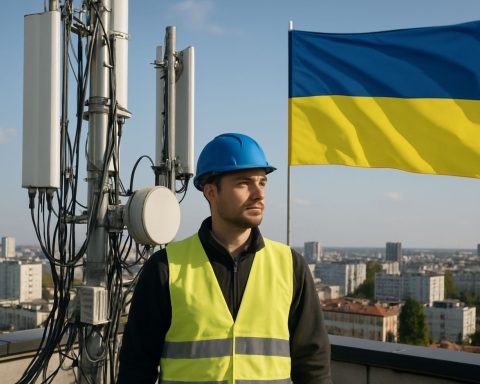- Gwangju, a burgeoning tech hub in South Korea, faces controversy over a 9 billion won educational contract.
- The selection process for this contract at Gwangju AI Academy raises allegations of conflict of interest.
- Concerns center on the role of the Korea Software Industry Association (KOSA) in the contract’s selection criteria.
- KOSA is accused of influencing the outcome by acting as both judge and participant.
- The incident underscores the need for ethics and transparency in tech and educational initiatives.
- The outcome may lead to reforms aimed at ensuring integrity in future innovations and contracts.
- The broader call is for global tech hubs to prioritize transparency to maintain trust in their projects.
Beneath the digital hum of South Korea’s rising tech hub, Gwangju, a drama unfurls that might seem more at home in corporate boardrooms than in the corridors of innovation. Towering skyscrapers and ambitious coders cast long shadows over Gwangju Information & Culture Industry Promotion Agency, where the recent selection process for a staggering 9 billion won educational contract has ignited allegations of conflict of interest.
At the epicenter of this storm is the prestigious Gwangju AI Academy, a beacon of futuristic education, slated to be powered by a blend of national and local funds. This grand project seeks to harness the collective genius of South Korea’s tech industry, shaping minds to drive the next wave of technological advancement.
However, critics now question the integrity of the process that saw a consortium led by renowned tech stalwart, EastSoft, rise to the top and become the preferred negotiation partner. The consortium’s win might have seemed unremarkable, save for the critical involvement of the Korea Software Industry Association (KOSA). As one of the crucial bodies that issued software performance confirmations—a key factor in the selection’s quantitative evaluation—KOSA stands accused of being both judge and player.
Gwangju’s AI Industry Convergence Project Group, a subsidiary node in this complex web, had carefully outlined its selection criteria in a proposal, assigning points for similar project experience over the past three years. Six out of the coveted 20 points were tied to venture histories certified by none other than KOSA itself.
Defending this approach, agency officials maintained the criteria were imported from a template used by the Public Procurement Service, arguing that these evaluations had always been mere references. Nevertheless, such defense did little to quell the unease among competing firms. Rumbles of discontent echoed through the community, drawing parallels to a referee deciding a game while conspicuously donning the jersey of one competing team.
As the dust settles, the tech industry in Gwangju stands at a pivotal moment. The incident prompts a deeper meditation on ethics and transparency in the intersections of industry, government, and education. Observers await what reforms, if any, might crystallize in response to this revelation, striving to ensure that tomorrow’s innovators learn in an environment free from the shadows of corporate maneuvering.
The broader message emerging from this controversy urges not just Gwangju but all centers of innovation to embrace transparency and integrity, lest their brightest dreams falter in the penumbra of doubt.
Is Gwangju’s AI Academy Setting a Precedent for Ethical Tech Development?
Key Facts and Background
Gwangju, South Korea, is rapidly becoming a critical node in the tech world, thanks to its ambitious projects like the Gwangju AI Academy. This venture, designed to leverage both national and local funding, aims to position the region as a leader in technological innovation. However, recent events surrounding a lucrative 9 billion won educational contract have sparked controversy over potential conflicts of interest.
At the heart of the debate is the involvement of the Korea Software Industry Association (KOSA) in the selection process for this contract. Critics note that KOSA’s dual role—as both a provider of performance confirmations and a participant in the consortium that won the contract—raises questions of transparency and fairness.
Insights & Implications
Ethics in Technology: The controversy highlights the need to ensure ethical guidelines in technology-related projects. Promoting transparency and avoiding conflicts of interest is crucial to ensure trust within the industry. This incident serves as a reminder that entities involved in the AI and tech sectors must establish clear ethical boundaries.
Impact on Innovation: This debacle risks casting a shadow over Gwangju’s aspirations to be a tech leader. It’s crucial for the community to address these concerns to prevent stifling innovation and inspiring confidence both locally and globally.
Industry Trends
The Gwangju situation also mirrors trends seen in tech sectors worldwide, where the nexus of government, industry, and education can create conflicts. This event underscores the importance of refining governance models in similar projects internationally.
Actionable Recommendations
1. Implement Clear Ethical Standards: Establish and follow guidelines to avoid potential conflicts of interest in tech projects involving multiple stakeholders.
2. Enhance Transparency: Organizations like KOSA should separate their roles as regulators and participants to maintain unbiased processes.
3. Strengthen Oversight: Stations such as the Gwangju AI Academy should have third-party oversight to ensure fair play in selection processes.
4. Stakeholder Engagement: Encourage dialogue among all parties involved—including industry players, educational institutions, and the public—to foster transparency and accountability.
How-to Steps for Ensuring Transparent Contracts
1. Set Up a Third-Party Oversight Committee: Appoint an impartial body to review and oversee major contracts, ensuring no participant equally serves as judge.
2. Publicize Evaluation Criteria: Make the criteria and scoring methodologies public to facilitate understanding and acceptance.
3. Divide Functions Clearly: Entities should separate regulatory functions from participation roles to avoid potential biases.
4. Regular Audits and Feedback Loops: Implement regular audits and feedback mechanisms allowing stakeholders to suggest improvements.
Related Links
For more on ethics in technology, explore Wall Street Journal and for insights into public procurement standards, visit Public Procurement Bureau.
This situation emphasizes the critical importance of maintaining integrity in tech hubs to pave the way for ethical advancements worldwide. Implementing stringent transparent policies can foster trust and position regions like Gwangju as paragons of innovation.





